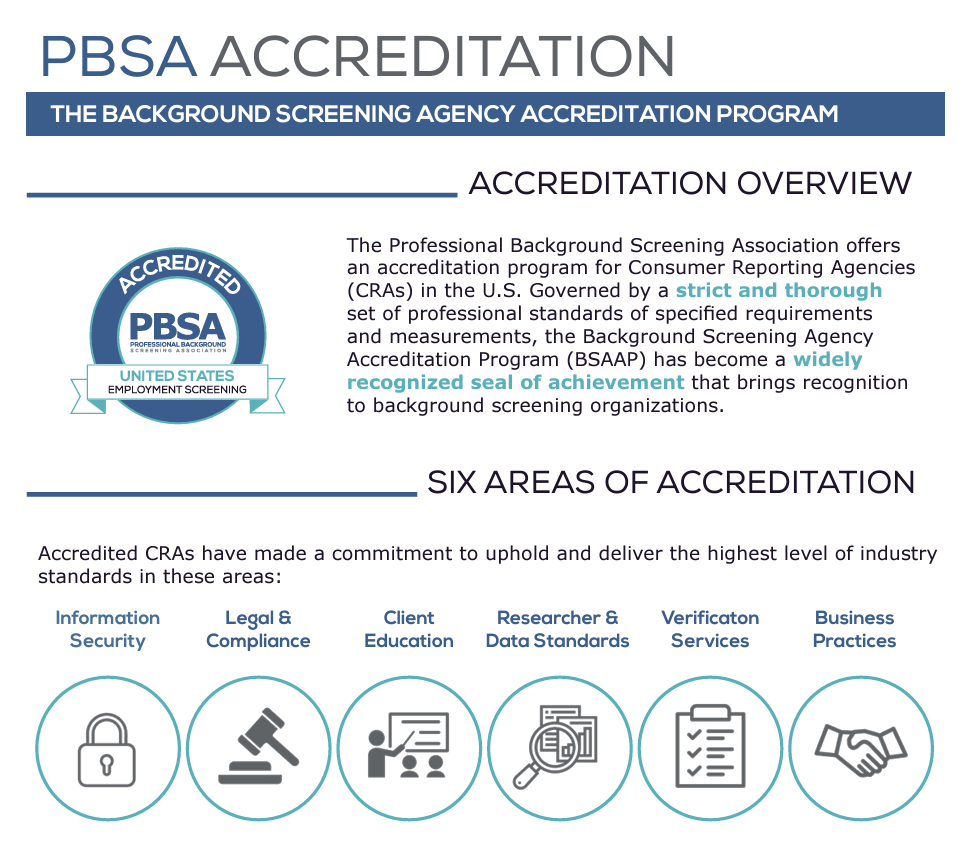Are you a talent acquisition leader looking for a background screening provider? You’re probably doing research on what makes background check providers unique and trying to determine which providers are reliable and credible. In doing your research, you may be finding that some providers advertise their accreditation with the Professional Background Screening Association (PBSA). But you notice that the vast majority of companies in the industry don’t have this certification, leading you to question the significance of PBSA accreditation. Is it really all that important?
Short answer: absolutely! Partnering with a PBSA-accredited screening company like InCheck helps you protect your patients, employees and reputation from a variety of serious but oft-overlooked risks. Allow me to explain why we take our recent re-accreditation so seriously.
What is PBSA accreditation?
First things first, the PBSA is a widely respected trade association. While it exists to represent the background screening industry, the organization’s founding members “wanted to establish and promote a high level of ethics and performance standards for the screening industry.” By participating in the PBSA’s Background Screening Organization Accreditation Program (BSOAP) (formerly known as the BSAAP), a screening company is publicly committing itself to the association’s rigorous expectations.
“The PBSA’s mission is to advance excellence in the screening profession,” says InCheck compliance manager Jonathan Culbertson. Their accreditation program sets out specific requirements and measurement standards for an organization’s operations. “A company that participates in that program is demonstrating their effort to strive for excellence and be accountable,” Culbertson adds.
The accreditation process
It’s one thing to say you’re committed to excellence, but how does a provider like InCheck actually demonstrate that commitment to the PBSA? The trade association sets out six unique standards covering every aspect of the screening process, which the PBSA outlines in the following graphic.

In total, these broad categories cover 68 standards accredited providers must meet. And demonstrating compliance with all of them isn’t a one-and-done procedure.
Over the course of many months, InCheck and other accreditation applicants submit material that shows their conformity to the PBSA’s myriad standards. That extensive data-gathering process is followed by a thorough desk audit, during which an independent auditor verifies the accuracy of the submitted information.
Following that multi-month process, the auditor conducts an on-site review of InCheck’s operations to confirm that we’re meeting or exceeding the established standards. The auditor then submits their findings to the PBSA’s Background Screening Credentialing Council, which makes a final accreditation determination.
“As you can see, it’s a lengthy process, taking almost one year to complete,” Culbertson explains. But the accreditation process isn’t entirely finished at this point. “At three years, there’s another desk audit; then at five years, the process starts all over.”
Put another way, the accreditation process never truly ends. InCheck has to demonstrate its commitment to the PBSA standards indefinitely at regular intervals. This is why so few screening providers earn this accreditation. Of the approximately 1,000 background screening companies in the US, Culbertson estimates that just 125 of them, roughly 13 percent, are accredited.
InCheck first earned PBSA Accreditation status on July 14, 2017, and received re-accreditation approval in March 2023.
Why accreditation matters
You’re probably beginning to see how this accreditation process protects your organization. Narrowing your options down from 1,000 screening companies to 125 of the best simplifies your search significantly. But let’s examine a few specifics.
Since healthcare is such a highly regulated industry, you have to carefully comply with a litany of laws, including those related to hiring. Although InCheck doesn’t dispense legal advice, our PBSA accreditation ensures that we can inform you of your obligations under the law, particularly the Fair Credit Reporting Act (FCRA).
The importance of compliance is clearest when considered in the context of hiring qualified candidates. Your screening process should enable you to accurately identify applicants with the right skills and experience while protecting their privacy. As a PBSA-accredited organization, InCheck has the expertise to help you manage that delicate balancing act—and avoid costly mistakes like attributing a record to the wrong candidate.
In sum, partnering with an accredited screening organization helps you avoid critical pitfalls in the hiring process. You may not know exactly where they are, but we do and we’ll help you safely navigate them.
But why InCheck?
The final question is, why choose InCheck over another accredited company? The answer is pretty simple. There’s a lot to think about when it comes to background screening: criminal background checks, drug testing, employment verification and so much more.
Your screening organization should understand that effectively providing these solutions helps you make the best hiring decision each and every time. That’s where we excel. “Each background screening is an opportunity for InCheck to serve others,” says Culbertson. “The bottom line is that our purpose is to provide superior service. We do that by serving our clients, their candidates and their employees.”
Need help reviewing your company’s screening process, protocol, and services? Reach out to hello@inchecksolutions.com or complete this form to set up a consultation.
